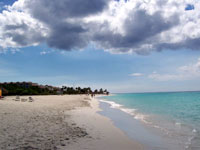Visit worldtravels.com for the full guide to Aruba. Build a complete Aruba travel guide and email to your clients - sign up for a trial subscription of World Travels Pro.
Aruba

Just 14 miles (25km) north of Venezuela, Aruba is the smallest and most Western island of the Dutch Antilles, which, known locally as the ABCs, also include Bonaire and Curaçao. With its miles of white, sandy beaches, turquoise-blue waters and guaranteed sun, Aruba is a great destination for sun-worshippers and a popular stop for cruise ship passengers. Over a million visitors arrive on this tiny island each year enticed by its luxury resorts, first-class restaurants, 24-hour casinos and excellent watersports facilities.
Most visitors stay either in the capital, Oranjestad, or just to the north in one of the many resort complexes on Eagle and Palm beaches. The remainder of the island is much less developed and in the arid interior there is nothing more substantial than cacti, divi-divi trees, contorted by the consistently strong trade winds, and herds of goats. For those who demand more than simply soaking up the sun there are plenty of activities available. There is good diving and snorkelling along the reef on the protected leeward coast and windsurfing is excellent a little further north at Fisherman's Hut. Deep-sea fishing can be arranged through many of the hotels.
Climate
With an average temperature of 82°F (28°C) Aruba is kept relatively cool by the constant trade winds. The peak tourist season is between mid-December and mid-April, and if you can visit outside this period you can expect room rates to be almost halved. Rainfall is infrequent, but likely to occur between October and January, if at all.
Money
The official currency is the Aruban Florin (AWG), which is divided into 100 cents. The Florin is tied to the US Dollar. US currency is accepted everywhere and other major currencies can be exchanged at banks. Credit and debit cards are widely accepted and there are ATMs in Oranjestad. Travellers cheques are also widely accepted and it is best to have cheques in US dollars or Euros to avoid additional charges.
Passport Visa
All passports must be valid for period of intended stay. Visitors must hold sufficient funds, onward or return tickets and all documents for next destination. As part of the Western Hemisphere Travel Initiative (WHTI), all travellers travelling between the United States and Canada, Mexico, Bermuda, and the Caribbean region are required to present a passport or other valid travel document to enter or re-enter the United States. If departing from the USA a valid passport will be required by immigration authorities.
Entry Requirements
- United States passport holders must have a valid passport or a Western Hemisphere Travel Initiative (WHTI) compliant document, or a government-issued photo ID, such as a driver's license, as well as proof of citizenship, such as an original or certified birth certificate. A visa is not required for stays of up to 30 days.
- UK nationals require a valid passport and irrespective of endorsement, British passport holders may stay for a maximum of 30 days without a visa.
- Canadian nationals require a valid passport, or a government-issued photo ID, such as a driver's license, as well as proof of citizenship, such as a birth certificate. A visa is not required for stays of up to 30 days.
- Australian nationals require a valid passport, but no visa for stays of up to 30 days.
- South African nationals must hold a valid passport and visa.
- Irish nationals require a valid passport, but no visa for stays of up to 30 days.
- New Zealanders require a valid passport, but a visa is not needed for a stay of up to 30 days.
Health
There are no special health requirements for visitors to Aruba, but travellers coming from yellow fever infected countries in Africa or the Americas, aged over six months, need an immunisation certificate. Aruba has experienced occasional outbreaks of dengue fever, a flu-like illness transmitted by Aedes mosquitoes that favour densely populated areas, therefore the use of insect repellent is advised. Visitors are warned that some types of fish, including some tropical reef fish, are poisonous when eaten, even cooked. Medical care is good in Aruba, which has one hospital, the Dr. H.E. Oduber Hospital, with three classes of service for patients depending on the level of their insurance. Health insurance is recommended. Food and water are considered safe.
Embassy Consulates
- Royal Netherlands Embassy, Washington DC, United States (also responsible for Aruba): +1 877 388 2443.
- Royal Netherlands Embassy, London, United Kingdom (also responsible for Aruba): +44 (0)20 7590 3200.
- Royal Netherlands Embassy, Ottawa, Canada (also responsible for Aruba): +1 613 237 5030.
- Royal Netherlands Embassy, Canberra, Australia (also responsible for Aruba): +61 (0)2 6220 9400.
- Royal Netherlands Embassy, Pretoria, South Africa (also responsible for Aruba): +27 (0)12 425 4500.
- Royal Netherlands Embassy, Dublin, Ireland (also responsible for Aruba): +353 (0)1 269 3444.
- Royal Netherlands Embassy, Wellington, New Zealand (also responsible for Aruba): +64 (0)4 471 6390.
Foreign Embassies
- US Consulate General, Curacao, Netherlands Antilles (also responsible for Aruba): +599 (0)9 461 3066.
- Consulate of Canada, Curaçao, Netherlands Antilles (also responsible for Aruba): +599 (0)9 466 1115.







